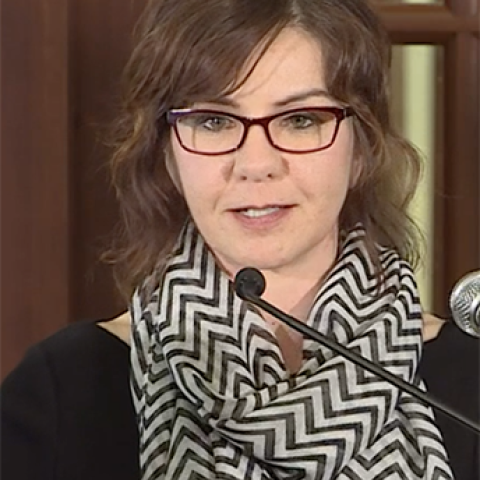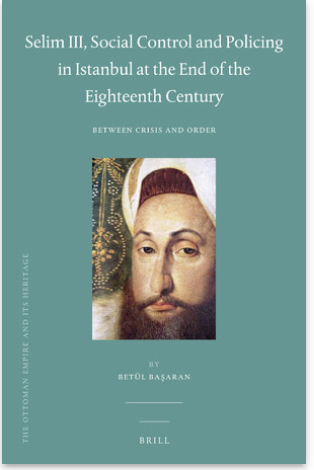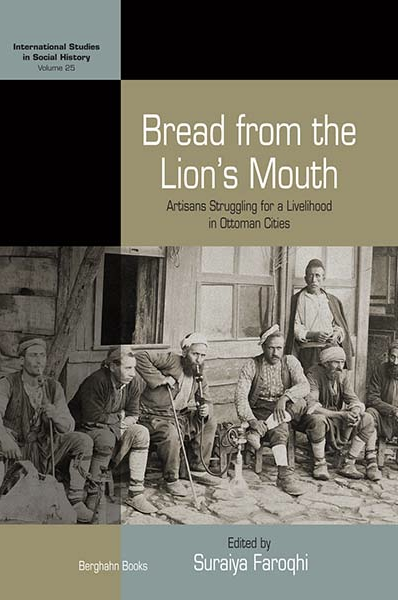Professor of History

Biography
I am a scholar of the Ottoman Empire with a focus on social, economic, legal, and political transformations of majority Muslim societies in the early modern and modern eras. My courses contribute to the cross-disciplinary areas of Asian Studies, Women Gender and Sexuality Studies, History, and Religious Studies. I use an integrated and comparative approach in my teaching, with an emphasis on cross-cultural encounters between the Muslim world, Europe and the Mediterranean. I have worked extensively in the Ottoman archives and taught Ottoman language at the University of Chicago and Georgetown University.
Born and raised in Izmir on the Aegean coast, I travel to Turkey regularly for research and family visits. I am very excited to return to India as a Fulbright Global Scholar for my current research project about the Ottoman princesses Durrushehvar and Niloufer, who married the sons of Hyderabad's 7th Nizam in 1931.
*On sabbatical leave for the 2025-2026 academic year
Areas of Research Specialization
- Ottoman Empire
- Social and Economic History of the Middle East
- Women, Gender and Sexuality Studies
- Mediterranean Studies
Areas of Teaching Specialization
- History of Islamic Societies
- Women in the Muslim world
- Ottoman Empire and the Mediterranean
- History of American Muslims
Internal Affiliations
External Affiliations
Education
-
Ph.D. in Near Eastern Languages and Civilizations at University of Chicago, 2006
Awards
- Virtual Fellowship at the Folger Institute
Professor of History Betül Başaran received a short-term Virtual Scholarly Research Fellowship at the Folger Shakespeare Library for the academic year 2023-24, in support of her project, “Cross-Cultural Intimacy and Mixed Marriages in the Ottoman Empire.” The award was made from a competitive pool of international candidates and will support the preparation of Başaran's article for publication in an edited volume of the proceedings of the Balance of Justice in the Ottoman Empire conference that she attended in October 2022 in Istanbul. The initial research for this project was previously supported by the Folger Shakespeare Library during the 2018-19 academic year during Başaran's last sabbatical.
- Fulbright Global Scholar Award (2020-21)
Professor of Religious Studies Betül Başaran has won a three-month Fulbright Global Scholar Research award to conduct critically important archival research in England and India for her book project on the legacy and impact of Princesses Niloufer (1916-1989) and Durrushehvar (1914-2006).
Başaran’s host institutions will be the School of Oriental and African Studies in London, The Centre for Historical Studies at Jawaharlal Nehru University (JNU) in New Delhi, and the Centre for Deccan Studies in Hyderabad. As a Fulbright Global Scholar, she will give lectures about her research at each of these institutions, and organize seminars with students who have an interest in Islamic Studies and Gender Studies.
Başaran’s project underscores the agency of Muslim women as important role models and pioneers in world history, in contrast to the contemporary western narrative most prevalent today that reduces them to mere victims or religious extremists.
The story of late Ottoman princesses and their cross-cultural journeys present a unique perspective to investigate the intertwined themes of international politics, religion, royalty, and Muslim women’s agency during a turbulent period of major social and political transformations in the 20th century. The princesses belonged to the Ottoman dynasty and were condemned to life-long exile after the collapse of the Ottoman Empire following World War I. Their life is a fascinating story of exile from Turkey to the French Riviera, followed by royal glamor in India as daughters-in-law of Hyderabad’s last independent ruler, where they evolved from foreign brides into cultural ambassadors dedicated to women’s empowerment.
Başaran’s project aims to enhance our understanding of the role of Ottoman princesses as transnational and cross-cultural agents for change during the 20th century.
- National Endowment for the Humanities Summer Seminar Award: “Transcending Boundaries: The Ottoman Empire, Europe and the Mediterranean World, 1500-1800”
Associate Professor of Religious Studies Betül Başaran received a prestigious institutional grant for St. Mary’s College of Maryland from the National Endowment for the Humanities to direct a four-week seminar for college and university professors in Washington, D.C. in the summer of 2016.
Her seminar is titled “Transcending Boundaries: The Ottoman Empire, Europe and the Mediterranean World, 1500-1800.” Sixteen scholars from around the country will join Başaran for an exploration of the history of religious, political and economic exchanges in the larger Mediterranean world in ways that transcend false distinctions between the so-called Christian and Islamic worlds and their societies in the early modern era.
NEH grants are highly competitive and involve a rigorous peer-review and selection process to ensure that the projects represent the highest level of humanities research and public engagement. The primary goal of the summer seminars is to advance humanities teaching.
More information about the seminar can be found at http://grants.smcm.edu/neh-summer-seminar-2016/.
- Folger Institute Fellowship
Betül Başaran received a fellowship at the Folger Shakespeare Library in Washington, D.C. for the academic year 2018-19, in support of her sabbatical project, “Cross-Cultural Intimacy and Marriage between Europeans and Ottoman Women in the Early Modern Era.” The fellowship provides support for up to a three-month residence at the Folger.
Fellowships are awarded by a committee of interdisciplinary, highly-respected scholars external to the Folger, who make recommendations on the basis of each project’s scope, promise, and high quality. Başaran’s project was judged to have exceptional merit. Basaran gave a lecture in March at the Library of Congress on a related topic of the nature of Ottoman sharia law and women’s roles and rights.
Spotlight
- PROFESSOR BAŞARAN CONTRIBUTES TO FASHION HISTORY
Professor of History and Coordinator of Women, Gender, and Sexuality Studies Program Betül Başaran published an essay on Princess Niloufer in An Eye for Couture: A Collector’s Exploration of 20th Century Fashion, with additional research by Christine Ramphal. Niloufer (1916-1989) was a late Ottoman princess who grew up in exile in France and later moved to Hyderabad, India as a young bride. Başaran’s essay complicates her story by drawing attention to Niloufer's cultural hybridity and her contributions to the advancement of women’s rights in Hyderabad state before India’s partition in 1947, in addition to her exquisite taste in fashion.
In this book, one of the world’s leading art dealers reveals her passion project—collecting French haute couture from the twentieth century and telling the stories of the women who wore them. These garments and accessories come to life through the women who wore them. Princess Niloufer of Hyderabad, known as one of the most beautiful women in the world, was photographed by Horst P. Horst for Vogue in 1939 and used her status to campaign for women’s rights. She is the subject of a specially commissioned essay by Prof. Başaran, after she received a Fulbright Global Scholar Award to research Niloufer’s life in Hyderabad. Christine Ramphal conducted additional research about fashion history to complement the essay.
- PROFESSOR BETÜL BAŞARAN PRESENTS PAPER IN PARIS
Professor of History Betül Başaran attended the conference "Perceptions de la guerre et de la sortie de guerre au Moyen-Orient (1918-1923): Expériences, narrations, re-construction des identités et perspectives" in Paris, where she gave a talk entitled "Niloufer Hanım Sultan: An Exiled Ottoman Princess in Hyderabad, India and Muslim Women's Leadership Roles after WW1." Başaran's research on Princess Niloufer was funded by a Fulbright Global Scholar Award in 2021 and allowed her to conduct critical archival research at the British Library in London, as well as in New Delhi and Hyderabad in India.
- BETÜL BAŞARAN INVITED SPEAKER AT INTERNATIONAL CONFERENCE IN INDIA
Professor of History and Religious Studies Betül Başaran is an invited speaker at the international conference organized by the Centre for Historical Studies at Jawaharlal Nehru University in Delhi, India, to commemorate International Women’s Day. “Women in the Freedom Struggle in India and Ireland: Reformism, Nationalism and Transnationalism in Perspective” will take place on March 13-14, 2023. Başaran's talk is entitled, “Princess Niloufer and Women's Transnational Networks in Hyderabad State before Partition.” Başaran's research for this paper was supported by a Fulbright Global Scholar Award in 2021-22.
- Başaran invited to speak on Princess Niloufer (1916-1989) at the Library of Congress as a part of Women’s History Month events
“Ottoman Princess Brides: Princess Niloufer in Hyderabad and Visual Journey of Exile,” focuses on Niloufer who was a member of the Ottoman royal dynasty and condemned to life-long exile following the collapse of the Ottoman Empire and abolition of the Islamic caliphate in 1924. Her life is a fascinating story of exile from Turkey to the French Riviera, followed by royal glamor in Hyderabad and her evolution into a modern princess dedicated to women’s empowerment. Her story reveals a young woman who pushed past borders and boundaries of politics, religion and culture to become a pioneer for women’s advancement.
Library of Congress, Thomas Jefferson Building 3/12/2019 at 12:00 PM
- “Cross-Cultural Intimacy and Marriage between Europeans and Ottoman Women in the Early Modern Era” at the Folger Institute, Washington DC
Associate Professor of Religious Studies Betül Başaran hosted a session of Material Witness on April 25 at the Deck B. Seminar Room at the Folger Shakespeare Library in Washington, D.C.Titled “Cross-Cultural Intimacy and Marriage between Europeans and Ottoman Women in the Early Modern Era,” Başaran examined the common cross-cultural sexual relations between European men and Ottoman (mostly Greek and Armenian Orthodox) women during the early modern period in Ottoman commercial centers, port cities, and islands according to select European sources in the Folger collection.
Material Witness, a Folger Institute fellowships program, is designed to bring fellows-in-residence into conversation with one another and with local scholars. The series allows them to consider the value of the material object itself: the books, manuscripts, works of art, or historical artifacts that are essential to their work, thought-processes, and ideas.
- Selim III, Social Control, and Policing in Istanbul at the end of the eighteenth century
In Selim III, Social Order and Policing in Istanbul at the End of the Eighteenth Century (Leiden: Brill, 2014) Başaran examines Sultan Selim III’s social control and surveillance measures. Drawing mainly from a set of inspection registers and censuses from the 1790s, as well as the Sharia court records she paints a colorful picture of the city’s residents and artisans. She argues that the period constitutes the beginnings of large-scale population control and crisis management and urges us to think about the Ottoman Empire as a polity that was increasingly becoming a “statistical” state, along with its contemporaries in Europe, and to go beyond mechanistic models of borrowing that focus primarily on military reform and European influence in our discussions of Ottoman reform and “modernity”.

- “Some Observations on Istanbul’s Artisans during the reign of Selim III (1789-1808)"
Betül Başaran and Cengiz Kırlı, in (ed.) Suraiya Faroqhi, Bread From the Lion’s Mouth: Artisans Struggling for a Livelihood in Ottoman Cities, New York/Oxford: Berghann Books, Feb 2015. http://www.berghahnbooks.com/title.php?rowtag=FaroqhiBread

